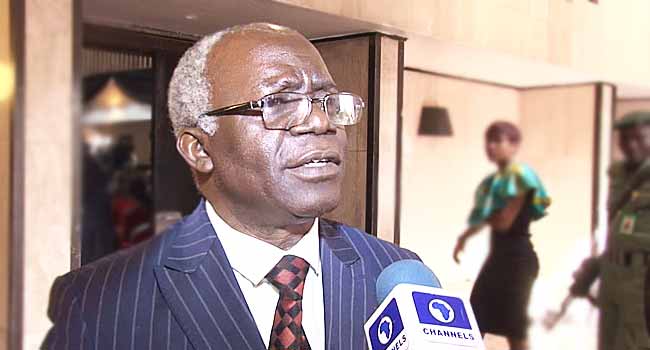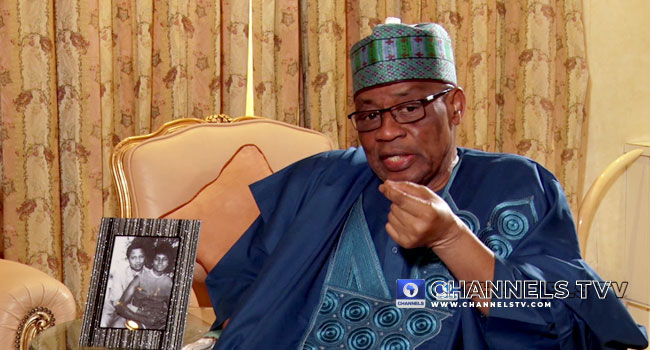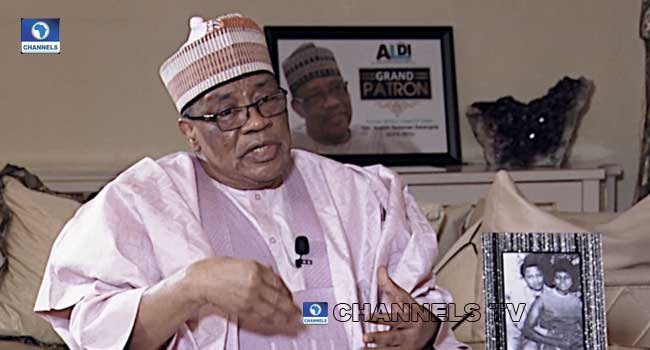
Senior Advocate of Nigeria, Femi Falana, has said that it is time for the Nigerian people to get answers to the where the sum of $12.2billion allegedly disappeared to under the watch of former military leader, General Ibrahim Badamosi Babangida.
The rights activist made the statement while giving a keynote address at the Conference on “Agenda Setting for Citizens’ Interaction with Stolen Assets Recovery: Abacha Loot Recovery and Utilization as Case Study”,
At the event which was organized by the Human and Environmental Development Agenda (HEDA) in Abuja, Mr. Falana said many Nigerians have indeed wondered why the anti-graft agencies have not investigated the disappearance of the sum of $12.2 from under the Ibrahim Babangida military junta.
He said that in the past the Federal High Court has struck out the case to get answers to the missing funds for want of locus standi on the part of the plaintiffs, he, however, argued that since the anti-graft agencies have the statutory power to recover stolen public money when traced, then they should do so and avail Nigerians answers as to the whereabouts of the funds.
Below is the full statement by the human rights advocate.
“Beyond the recovery of the Sani Abacha Loot (Being the keynote address delivered by Femi Falana SAN at the Conference on “Agenda Setting for Citizens’ Interaction with Stolen Assets Recovery: Abacha Loot Recovery and Utilization as Case Study” organized by the Human and Environmental Development Agenda (HEDA) held at Abuja on July 3, 2019)
Following the death of the then military Head of State, General Sani Abacha on June 8, 1998, his successor, General Abdulsalami Abubakar ordered a probe into the looting of the Central Bank of Nigeria from 1993-1998. At the end of the enquiry, it was established that the late dictator stole over $5 billion from the vaults of the CBN through his National Security Adviser, Mr. Mohammed Gwazo. A substantial part of the stolen fund has since been traced to over 140 bank accounts in western countries and some remote islands in the world.
READ ALSO: Falana Asks Court To Compel FG To Recover $40bn, N481bn
Based on the report of the investigation the Federal Government recovered $635 million, £75 million, DM 30 million and N9 billion as well as several vehicles and properties in Abuja, Lagos and Kano together with 40% interests in West African Refinery in Sierra Leone. Other assets were recovered from the family and associates of the late General Abacha. The forfeited assets were promulgated into law and signed by General Abubakar on 26th May 1999. I have since confirmed that all the funds and assets listed in the Schedule to the Forfeiture of Assets, Etc. (Certain Persons) Decree no 53 of 1999 had been recovered and forfeited to the Federal Government.
Upon the restoration of civil rule in May 1999 the Olusegun Obasanjo Administration embarked on the recovery of the remaining Abacha loot. At page 495 of the second volume of his book entitled “My Watch” former President Obasanjo stated that “…by the time I left office in May 2009 (sic), over $2 billion and £100 million had been recovered from the Abacha family abroad, and well as N10 billion in cash and properties locally.”
Under the Goodluck Jonathan Administration, the recovery efforts continued and more of the loot was recovered. According to the government, its efforts led to the recovery of $226.3 million from Liechtenstein in addition to the €7.5 Million that was recovered from an associated company of the Abacha’s in Liechtenstein. The Federal Government also recovered and repatriated the sum of £22.5 million confiscated from an associate of the Abacha family by the Authorities of the Island of Jersey.
Based on public demand for a detailed account of the loot recovered by the federal government, a former Minister of Finance, claimed rather falsely that the sum of $500 million from the Abacha loot had been spent on some projects in the six geopolitical zones in the country. To lend credence to the fraudulent claim, the World Bank confirmed, in a reply to an enquiry by SERAP, that the $500 million had been judiciously spent on some development projects. The Human and Environmental Development Agenda (HEDA attempted to confirm the projects but could not locate them. It was at that juncture that the Board of the World Bank withdrew its endorsemd nt of the phantom ptojects.
Sometime in 2015, the Premium Times, an online news medium reported that $322 million and £5.5 million from the Abacha loot was released to a former National Security, Colonel Sambo Dasuki (rtd). While confirming the transfer of the fund, a former Minister of Finance stated that it was released under an emergency to purchase arms and ammunition to prosecute the war on terror. From the investigation conducted by the EFCC, it has been confirmed that the fund earmarked for arms procurement was distributed to well-known individuals.
With respect, the excuse for the release of the sum of $322 million and £5.5 million for the alleged prosecution of the war on terror is untenable having regards to the fact that former President Jonathan had secured the approval of the National Assembly to take a loan of $1 billion to equip the armed forces to fight insurgency. Therefore, the self-induced urgency created by the government is not a justification for the utter violation of the Constitution and the Public Procurement Act.
In spite of public pressure, the federal government ignored the demand to account for the loot. Thus, the Socio-Economic and Accountability Project (SERAP) filed an action at the federal high court for mandamus to compel the federal government to account for the loot. In a historic judgment delivered in the case, the presiding judge, Idris J. (as he then was) granted the reliefs sought by SERAP and ordered successive governments to account for all loot recovered since 1999. A former President whose administration recovered the bulk of the loot arrogantly said that the judge was “stupid” for having the temerity to have asked him to account among other rulers.
It is public knowledge that the recovery of the Abacha loot has continued. Last year, the federal government recovered $321 million from Switzerland. Based on the agreement with the Swiss government the said sum of $321 million is currently being distributed to the poorest people in Nigeria as part of the cash transfer policy of the Buhari administration. Another sum of $268 million has just been confiscated by the British government. Curiously, the British, American and Swiss governments are insisting that they are entitled to a share of the confiscated loot. On account of the loot that has recovered so far by the federal government, President Buhari ought to publicly apologize to the Nigerian people having denied that the late General Sani Abacha was involved in the criminal diversion of public funds.
From the foregoing, it is pertinent to note that not less than $3.5 billion had been recovered from the Abacha loot. Much more can still be recovered. But apart from demanding for the full account of the Abacha loot, we must insist that the investigation of the criminal diversion of looted wealth be extended to cover other indicted public officers. During the electioneering campaign last year, President Buhari threatened to probe the $16 billion allegedly purportedly spent on generating electricity in the country. This allegation ought to be investigated without any further delay.
Many Nigerians have indeed wondered why the anti-graft agencies have not investigated the disappearance of the sum of $12.2 from under the Ibrahim Babangida military junta. A few years ago, the SERAP and other 5 other NGOs sought to compel the federal government to recover the huge fund. But the Federal High Court struck out the case for want of locus standi on the part of the plaintiffs. But since the anti-graft agencies have the statutory power to recover stolen public money it is traced. Since the probe has been delayed on the grounds that the federal government could not locate a copy of the report of the Pius Okigbo Panel on reorganisation of the Central Bank. Happily, a human rights body which has found a copy of the report will not hesitate to collaborate with the anti-graft agencies if they are willing to investigate the missing fund.
Finally, while thanking HEDA for this all-important conference I wish to challenge the progressive CSOs in Nigeria to link up with their colleagues in Europe, America and Middle East for joint efforts in mounting pressure on foreign governments, banks and other financial institutions that are warehousing the stolen wealth of the people of Nigeria. We must learn from some CSOs that have embarked on independent initiatives to recover the looted wealth and assets belonging to African countries.”




